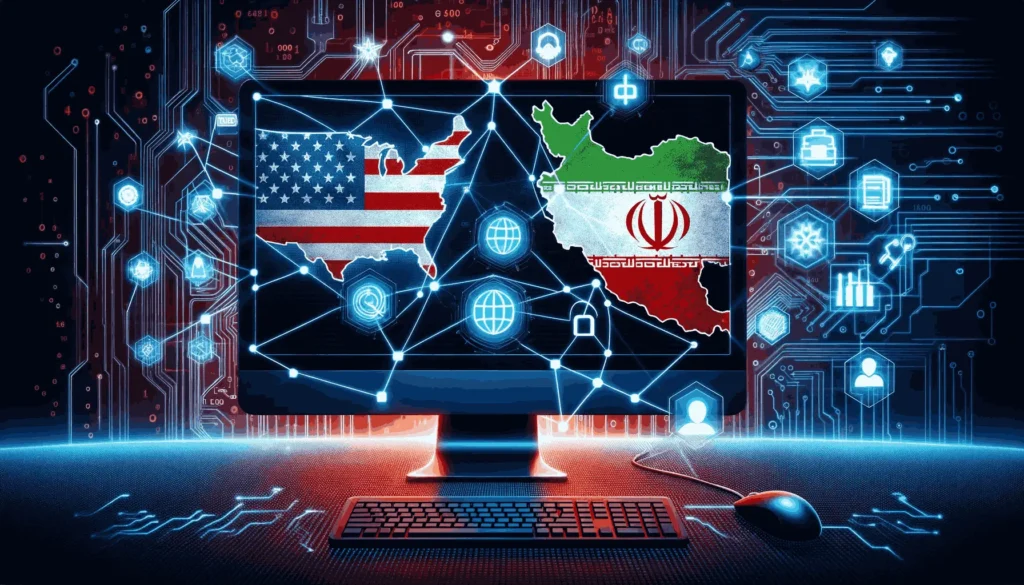Iran cyber attacks, Microsoft election report, 2024 U.S. election interference, U.S. election security in the Upcoming US Election: A Critical Threat Identified by Microsoft
Introduction
Microsoft recently issued a serious warning about Iran’s growing cyber activities aimed at disrupting the upcoming 2024 U.S. presidential election. The tech company’s latest report reveals that Iran is using sophisticated digital tools to spread fake news, launch phishing attacks, and create websites designed to influence American voters. This article breaks down Microsoft’s findings, explaining why they matter and what they could mean for the 2024 election.

Microsoft warns of Iran’s advanced cyber operations
Iran’s Cyber Threats Are Growing
According to Microsoft, Iran has significantly increased its cyber activities in recent months. These actions are part of a broader effort to interfere in the U.S. election, especially the race between former President Donald Trump and his Democratic opponents. The report is one of the first detailed analyses since Vice President Kamala Harris became the Democratic nominee, replacing President Joe Biden, who dropped out of the race last month.
“Foreign interference in the 2024 U.S. election started off slowly but has steadily picked up pace over the last six months,” the report explains. Initially, Russia was the main actor, but recently, Iranian activity has become more significant. This growing cyber threat from Iran aligns with warnings from U.S. intelligence officials, who have long said that Iran’s cyber capabilities are comparable to those of Russia and China, making it a serious concern.
Targeting Presidential Campaigns
One of the most alarming parts of Microsoft’s report is Iran’s alleged attempt to hack the email accounts of key officials within a U.S. presidential campaign. In June, the Islamic Revolutionary Guard Corps (IRGC) reportedly launched a phishing attack aimed at gaining access to a senior campaign official’s computer network. While Microsoft did not specify which candidate’s campaign was targeted, the implications of such an attack are concerning.
This situation is reminiscent of the 2016 election when Russian hackers infiltrated the email servers of the Democratic National Committee by targeting Hillary Clinton’s campaign manager. The release of sensitive emails during that time had a significant impact on the election, and a similar incident in 2024 could have equally serious consequences.
Spreading Fake News and Propaganda
Iran’s cyber strategy involves more than just direct attacks on campaign officials. Microsoft’s report highlights how Iranian cyber groups have been busy creating fake news websites and spreading propaganda intended to divide American voters. One such website, Nio Thinker, initially focused on the Israel-Hamas conflict but has since shifted its attention to the U.S. election.
The content on Nio Thinker is aimed at liberal audiences and includes sarcastic and inflammatory articles attacking Trump. For example, one article called Trump an “opioid-pilled elephant in the MAGA china shop” and a “raving mad litigiosaur.” These efforts are part of a broader campaign to create divisions among Americans, particularly in key battleground states where the election could be decided.
Fake news and propaganda are not new, but the level of sophistication and the targeting of specific groups make these efforts especially dangerous. By creating content that resonates with certain segments of the population, Iranian cyber actors can influence voter behavior and further polarize American society.
Iran’s Broader Cyber Campaign
The cyber groups behind these operations are reportedly linked to the Iranian government, with code names like Sefid Flood, Mint Sandstorm, Peach Sandstorm, and Storm-2035. These groups have been active for months, using various tactics to interfere with the election process.
Microsoft’s report provides more detail than recent briefings from U.S. intelligence agencies about the specific activities of these groups. Many of them are believed to be controlled by Iran’s Revolutionary Guards, a powerful military force in the country. However, Iran’s United Nations mission in New York has denied any involvement in cyberattacks against the U.S. presidential election.
The U.S. Justice Department has also been investigating Iranian efforts to interfere in the election. In a related case, criminal charges were recently unsealed against a Pakistani man accused of working with Tehran to plan assassination plots in the U.S., possibly targeting Trump. This shows that Iran’s malicious activities are not limited to cyber interference but also include physical threats.
Amplifying U.S. Protests
Another part of Iran’s cyber campaign involves amplifying U.S. protests over Israel’s war against Hamas in Gaza. According to Director of National Intelligence Avril Haines, Iran is using these protests to further divide the American public and influence the election.
By taking advantage of existing social and political tensions, Iran is creating a more chaotic and polarized environment in the U.S. This strategy is similar to those used by Russia and China, aiming to undermine public trust in the electoral process and weaken the U.S. from within.
What This Means for the 2024 Election
The increasing sophistication and intensity of Iran’s cyber operations pose a serious threat to the integrity of the 2024 U.S. election. As election day approaches, these activities are likely to escalate, with Iran continuing to use digital platforms to influence voter behavior.
Microsoft’s report is a strong reminder of the vulnerabilities in the U.S. electoral system, especially in the digital age. The combination of disinformation, phishing attacks, and propaganda campaigns creates a complex and multifaceted threat that requires a strong response from both the government and the private sector.
Conclusion
Iran’s growing cyber interference in the upcoming U.S. election is a critical challenge that threatens the integrity of the democratic process. As Microsoft’s report highlights, Iran’s cyber actors are using increasingly sophisticated tactics to influence the election, with potentially serious consequences. As the election draws nearer, the U.S. must remain vigilant in countering these threats and protecting the electoral process from foreign interference.
Reference Article – USA Today








